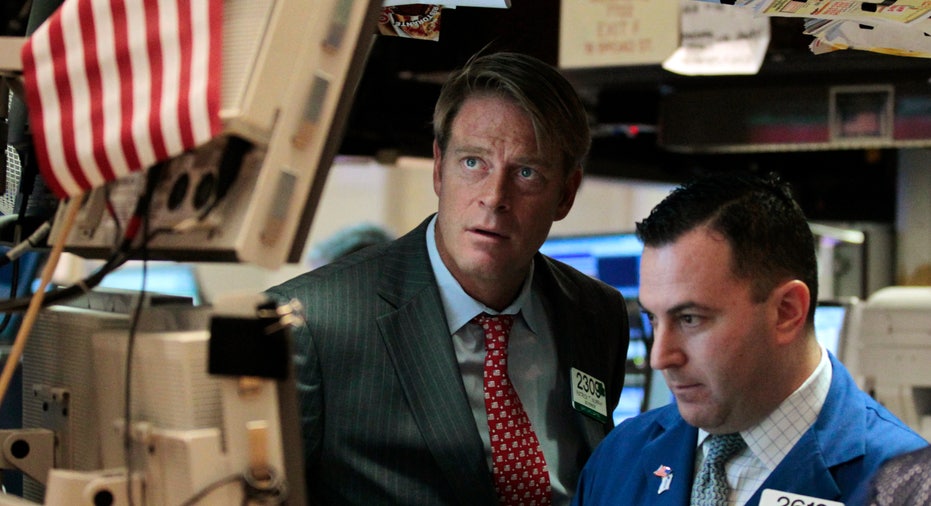Doom Street: Stocks Walloped in Worst Quarter Since '08 Financial Crisis

FOX Business: The Power to Prosper
A stalling global economy, political gridlock and Europe's deepening debt debacle captivated the markets in the third quarter and sent traders dashing out of equities and many commodities alike. All in all, the blue chips plunged roughly 1,500 points in the worst quarterly rout since the depths of the financial crisis in 2008.
Today's Markets
The Dow Jones Industrial Average dropped 241 points, or 2.2%, to 10,913, the S&P 500 dipped 29 points, or 2.5%, to 1,131 and the Nadsaq Composite fell 65.4 points, or 2.6%, to 2,415. The FOX 50 fell 19.1 points to 833.
For the quarter,the Dow shed 12.1%, the S&P 500 plummeted 14.3% and the Nasdaq slid 12.9%.
Wall Street moved at break-neck speed throughout the entire quarter. Indeed, the Dow made triple-digit moves in either direction on a regular basis. Traders were spooked by signs pointing to an economic slowdown, and potentially even another recession. Meanwhile, a deadlock in Washington, D.C. over raising the U.S. debt limit nearly sparked a selective default of American debt, and contributed to Standard & Poor's slashing the U.S.'s pristine triple-A credit rating.
At the same time, headlines from Europe reverberated across the Atlantic and rattled U.S. markets. Of particular concern has been the chance that Greece may have to default on its debt if it doesn't receive an enormous bailout package from international lenders, a move that has ignited widespread political angst across the 17-member euro currency bloc. And many analysts fear a Greek default could produce shockwaves that put the entire world financial system in peril.
Of the blue chips, Caterpillar (NYSE:CAT), 3M (NYSE:MMM) and United Technologies (NYSE:UTX) contributed the most to the Dow's rout. In energy markets, crude oil plunged 17% -- also the worst retreat since the financial crisis. Gold, which was used as a safe-haven during many of the most intense downturns, was up more than 7% for the quarter, but has recently receded from record highs. Also in a sign of the tumult, the benchmark 10-year took its biggest loss since the financial crisis.
Data Deluge
Economic data releases were mixed on Friday, however, the broadly negative trend for the economy still spooked traders. Indeed, in a sign of the fears, the Treasury yields have fallen sharply: the benchmark 10-year note is presently yielding 1.9% from 2.001%.
Personal income fell 0.1% in August, the first decline since October 2009, and weaker than the 0.1% gain economists anticipated. Consumer spending was up 0.1% for the month, which was in line with expectations.
Meanwhile, the final reading of the Reuters/University of Michigan showed consumer sentiment edged up in late September, but remained glum. Consumer sentiment came in at 59.4 in September, from a previous reading of 57.8, and higher than estimates of 57.8.
Consumption is a key component in economic expansion, and can have an impact on many sectors. In particular, retailers like Target (NYSE:TGT) can be affected by these data, especially with just months to go before the key holiday buying season this winter.
Manufacturing in the Chicago region expanded quicker than economists expected in September. The Institute for Supply Management's gauge rose to 60.4 from 56.5, easily topping expectations of 55.5. The Chicago report comes ahead of the more closely-tracked nationwide report, and generally correlates reasonably well with that report, according to economists at Nomura.
The manufacturing sector took a hard hit from several economic factors, including high energy prices, and lingering supply-chain impacts of the earthquake that slammed Japan in March.
The Chinese manufacturing sector contracted for a third-straight month in September, adding to worries that the world's second-largest economy may be slowing down.
Inflation in the euro zone picked up speed drastically in September, soaring 3% from 2010, a quicker pace than the 2.5% in August, and well above the European Central Bank's inflation target of 2%. Indeed, September marked the swiftest increase since October 2008.
"This development is likely to limit the ECB's willingness to provide more monetary stimulus, despite recent poor news on activity," economists at Barclays Capital wrote in a research note.
Also on the euro zone front, Austria's parliament approved giving the region's sovereign rescue fund additional powers to help aid with bailouts such of that of Greece. Germany's lower house approved the changes on Thursday, considered to be one of the most crucial votes of confidence, but all of the 17 currency members of the currency bloc must agree.
Negotiations were ongoing in Greece between international inspectors, called the "troika," regarding the next tranche of funding the country needs to avoid defaulting in October.
In currencies, the euro sunk 1% against the U.S. dollar, while the greenback rose 0.62% against a basket of world currencies.
Energy markets were mixed, shedding heavy losses. Light, sweet crude fell $1.00, or 1.2%, to $81.13 a barrel. Wholesale RBOB gasoline rose 3 cents, or 1.1%, to $2.59 a gallon.
Gold climbed $5.00, or 0.31%, to $1,622 a troy ounce. The precious metal is headed for its worst monthly fall since the financial crisis in 2008.
Corporate News
Eastman Kodak (NYSE:EK) shares plunged 60% amid reports that the struggling company had hired a restructuring adviser.
Morgan Stanley (NYSE:MS) saw its share tumble nearly 10%, while the costs to insure its debt jumped, amid concerns over its exposure to European banks.
Foreign Markets
The Euro Stoxx 50 slid 1.5% to 2,180, the English FTSE 100 fell 1.3% to 5,197 and the German DAX tumbled 2.4% to 5,402.
In Asia, the Japanese Nikkei 225 slipped 0.01% to 8,700 and the Chinese Hang Seng dipped 2.3% to 17,592.



















